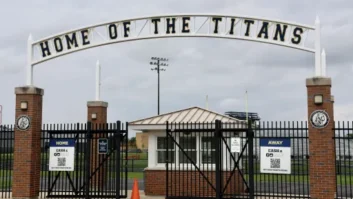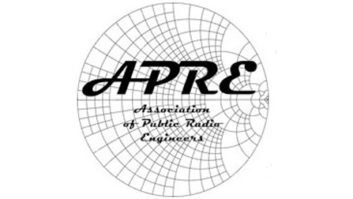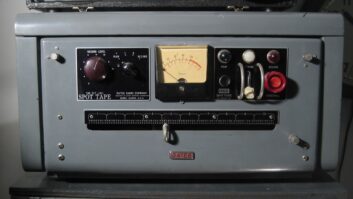Public radio and television, like all broadcast media, are in a state of transition. Many stations are redefining relationships with their audiences as social media and new delivery platforms take hold; some also are rebranding themselves, as an identity with call letters, FM, TV and big towers in the sky doesn’t seem as important as it once was. All are adapting to a rate of technological change that only seems to quicken with every passing day.

Kempf, center, at work with members of the digital team. It is into this challenging environment that Bob Kempf, formerly vice president and general manager of digital services of NPR, joined WGBH in Boston as its vice president for digital services in September.
There, he works across the organization to create digital products, platforms and services related to WGBH programs and journalism.
Radio World spoke with Kempf about his vision for managing these and other challenges at his new position, which supports WGBH programming no matter where it appears, be that with a national network, digital platform or under its own brands.
Kempf manages a staff of 40. Three-quarters of them work on national programs, such as “Frontline,” “Antiques Roadshow,” “Masterpiece” and “Nova.” Ten staff members are attached to local programming.
CULTURAL FUSION
“I learn a lot from the people on my team,” says Kempf. “They bring to the table not only a knowledge of code, but also innovative ways of working. It’s really a fusion of the tech and media cultures.”
He said the management style is team-focused, rather than top down. They embark on short cycles of building new products, releasing and improving them.
As stations rebrand and remarket themselves in order to better align with the online world, two questions come to mind. Will we see the demise of terrestrial broadcasting over the next 10 years? And what are Kempf’s thoughts on rebranding WGBH?
“Certainly the emphasis on online media will continue to increase, while the importance of linear broadcast will decline. However, I don’t see the towers and transmitters going completely away in the next decade.”
He continues, “Rebranding can be a positive step for some public broadcasters. Cleveland’s Ideastream, KPBS and Alaska Public Media have all successfully recast themselves as online entities. I think we’re very fortunate here at WGBH, because our brand is already so well known; I don’t believe any efforts at redefining our identity are necessary.”
Community building and harvesting the online community both for information and fundraising dollars have become hot topics in public media. Recent efforts by community broadcaster WFMU with its Audience Engine advocate for keeping online dialogue and fundraising efforts in-house, as opposed to having it take place via big media such as Facebook or Twitter. Should a broadcaster’s digital strategy include keeping the listener dialogue and fundraising internal?
DON’T PLAY FAVORITES
“Building and maintaining an online relationship with the audience is the most important challenge and greatest opportunity for public radio. I don’t think that we can view it as choosing between an internal or external location. You need to pull the best information out of both, and understand why you’re in both. Knowing that, you can strengthen the core experience for listeners,” Kempf said.
“Fundraising is a billion dollar economy, accounting for half of public media’s revenue. While there is a lot of merit to maintaining an in-house dialogue, you can’t ignore the big players, either. To do so runs the risk of losing a connection with the audience. You need to ask and answer the question: How do you play on Facebook?”
In terms of promotion and community building, Kempf cites an example of how a “Frontline” segment was promoted on Facebook. “A five-minute post about an ISIS-controlled village in Afghanistan generated 10 million views and got 100,000 shares. Social media is a very powerful way to expand the ‘Frontline’ brand.”
Strategic planners often advise organizations to step back and ask themselves what business they are in. What business is public media in right now, and is this the business it should be in?
“I recently re-read the original NPR vision statement,” said Kempf. “It was penned in 1970 by Bill Siemering, one of the original founders. It says in part, ‘National Public Radio will serve the individual: It will promote personal growth; it will regard the individual differences among men with respect and joy rather than derision and hate; it will celebrate the human experience as infinitely varied rather than vacuous and banal; it will encourage a sense of active constructive participation, rather than apathetic helplessness.’
“That statement still resonates today. Beyond that, we need to remember that even though we are non-commercial, we are in a business. We are in the business of creating connections, of being storytellers, and creating community around those stories.”
Much of Kempf’s new job at WGBH involves providing leadership in keeping the organization abreast of new technologies. How do you conduct strategic planning in a realm where change is a constant?
“You can’t do strategic planning in the traditional sense anymore. What you can do is engage in short cycles of test-measure-learn. Look at how the audience reacts to what you’re doing, and develop smart ways of building on that over time.” He adds, “We must be mindful of how our audience is consuming content of all kinds. That makes you ask questions like, ‘how do podcasts affect audio?’”
Maintaining an online dialogue with listeners and members is an ongoing priority for public media. Where is WGBH now, and where should it be in five years?
WGBH STATIONS
What began in 1951 as a single FM station — WGBH 89.7 in Boston — has grown over the years into a number of FM, TV and online channels serving metro Boston and surrounding communities.
On the radio side, WGBH(FM) also operates WCRB 99.5 with a classical music service. This signal is simulcast by WNCK 89.5 Nantucket and WJMF 88.7, Smithfield, R.I. WCRB is also broadcast over translator W242AA, 96.3, East Cambridge, Mass.
WGBH operates a separate news-and-information service for Cape Cod and the islands. The format is aired on three stations: WZAI 94.3 Brewster; WNAN 91.1 Nantucket and WCAI 90.1 Woods Hole. The WCAI and WCRB channels are also broadcast over WGBH(FM)’s HD Radio channels.
The WGBH(TV) digital channel is multiplexed. Channel 2.1 carries the main WGBH programming and PBS. Channel 2.2 broadcasts WGBH World. WGBX airs original programs not broadcast on WGBH, as well as reruns of the latter’s programs on digital channel 44.1 WGBH Create airs on channel 44.3, while ’GBH Kids is seen on 44.4.
The WGBH Educational Foundation operates WGBY Channel 57 in Springfield, Mass. WGBY is run separately from the Boston operations, although the programming is similar to WGBX.
All radio and TV channels are also streamed over the Web, along with original Web content, at wgbh.org.
GOALS
“Our engagement with the audience has room to grow. One of my priorities is to develop a more coherent social strategy centered on marketing and customer support. We’re using the power of our brand to launch My WGBH, an online site for members that provides them access to additional content and a personalized experience. It will build a value proposition for our members, and through customer relationship management enable us to learn more about them at the same time, for example, what content are they looking for from WGBH?”
Audience building is also a priority for Kempf. “Right now our digital audience for local programming is relatively small. I’d like to see us grow so that our local presence digitally is equal to our outreach over the air. There are three pieces to make that happen — social media, content delivery and managing the data.”
Kempf earned his undergraduate degree from Boston College, where he majored in political science and philosophy. How does a degree in liberal arts prepare one for a career in media and technology management?
“The short answer is — it doesn’t, although a liberal arts education does give you a sense of what is important in the world. In my case, it also gives me a sense of the importance of public media’s mission.”
Kempf recalls his brief stint as a disc jockey. “I had my own morning show on the college’s carrier current station, WVBC. It was widely listened to in the dining commons. So I guess I did get some hands-on radio skills at Boston College.”
Tom Vernon is a longtime contributor to Radio World. Find more of his articles by searching keyword “Vernon” onradioworld.com.







